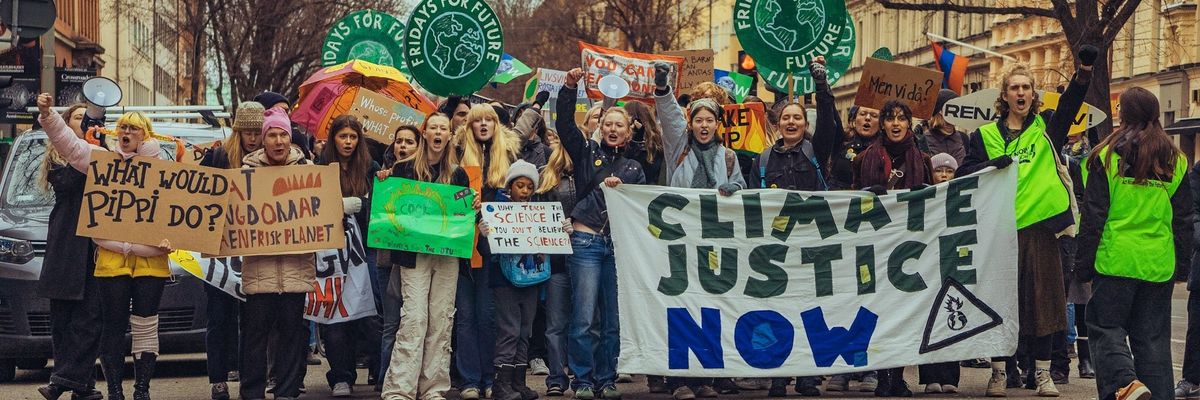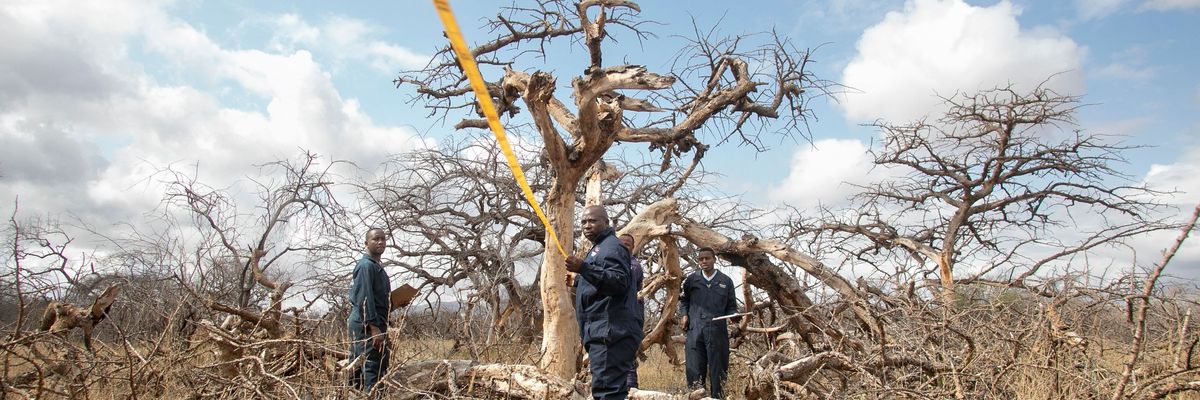Youth Lead Global Strike Demanding ‘Climate Justice Now’
Original article by OLIVIA ROSANE republished from Common Dreams under Creative Commons (CC BY-NC-ND 3.0).

“We are many people and youths who want to express our frustration over what decision-makers are doing right now: They don’t care about our future and aren’t doing anything to stop the climate crisis,” one young activist said.
Ahead of Earth Day, young people around the world are participating in a global strike on Friday to demand “climate justice now.”
In Sweden, Greta Thunberg joined hundreds of other demonstrators for a march in Stockholm; in Kenya, participants demanded that their government join the Fossil Fuel Non-Proliferation Treaty; and in the U.S., youth activists are kicking off more than 200 Earth Day protests directed at pressing President Joe Biden to declare a climate emergency.
“We’re gathered here to fight, once again, for climate justice,” Thunberg told Agence France-Presse at the Stockholm protest, which drew around 500 people. “It’s now been more than five and a half years that we’ve been doing the same thing, organizing big global strikes for the climate and gathering people, youths from the entire world.”
“I lost my home to climate change. Now I’m fighting so that others don’t lose their homes.”
The first global youth climate strike, which grew out of Thunberg’s Fridays for Future school strikes, took place on March 15, 2019. Since then, both emissions and temperatures have continued to rise, with 2023 blowing past the record for hottest year. Yet, according to Climate Action Tracker, no country has policies in place that are compatible with limiting global heating to 1.5°C above preindustrial levels.
“We are many people and youths who want to express our frustration over what decision-makers are doing right now: They don’t care about our future and aren’t doing anything to stop the climate crisis,” Karla Alfaro Gripe, an 18-year-old participant at the Stockholm march, told AFP.
The global strikes are taking place under the umbrella of Friday’s for Future, which has three main demands: 1. limit temperature rise to 1.5°C, 2. ensure climate justice and equity, and 3. listen to the most accurate, up-to-date science.
“Fight with us for a world worth living in,” the group wrote on their website, next to a link inviting visitors to find actions in their countries.
Participants shared videos and images of their actions on social media.
European strikers also gathered in London, Dublin, and Madrid.
In Asia, Save Future Bangladesh founder Nayon Sorkar posted a video from the Meghna River on Bangladesh’s Bola Island, where erosion destroyed his family’s home when he was three years old.
“I lost my home to climate change,” Sorkar wrote. “Now I’m fighting so that others don’t lose their homes.”
Also in Bangladesh, larger crowds rallied in Dhaka, Sylhet, Feni, and Bandarban for climate action.
“Young climate activists in Bandarban demand a shift to renewable energy and away from fossil fuels,” said Sajjad Hossain, the divisional coordinator for Youthnet for Climate Justice Bangladesh. “We voiced urgency for sustainable energy strategies and climate justice. Let’s hold governments accountable for a just transition!”
In Kenya, young people struck specifically to demand that the government sign on to the Fossil Fuel Non-Proliferation Treaty.
“As a member of the Lake Victoria community, the importance of the treaty in our climate strikes cannot be overstated,” Rahmina Paullette, founder of Kisumu Environmental Champions and a coordinator for Fridays for Future Africa, said in a statement. “By advocating for its implementation, we address the triple threat of climate change, plastic pollution, and environmental injustice facing our nation.”
“Halting fossil fuel expansion not only safeguards crucial ecosystems but also combats the unjust impacts of environmental degradation, ensuring a more equitable and sustainable future for our community and the wider Kenyan society,” Paullette said.
In the U.S., Fridays for Future NYC planned for what they expected to be the largest New York City climate protest since September 2023’s March to End Fossil Fuels. The action will begin at Foley Square at 2:00 pm Eastern Time, at which point more than 1,000 students and organizers are expected to walk across the Brooklyn Bridge to rally in front of Borough Hall.
The strike “is part of a national escalation of youth-led actions in more than 200 cities and college campuses around the country, all calling on President Biden to listen to our generation and young voters, stop expanding fossil fuels, and declare a climate emergency that meaningfully addresses fossil fuels, creating millions of good paying union jobs, and preparing us for climate disasters in the process,” Fridays for Future NYC said in a statement.
The coalition behind the climate emergency drive, which also includes the Sunrise Movement, Fridays for Future USA, and Campus Climate Network, got encouraging news on Wednesday when Bloomberg reported that the White House had reopened internal discussions into potentially declaring a climate emergency.
“We’re staring down another summer of floods, fires, hurricanes, and extreme heat,” Sunrise executive director Aru Shiney-Ajay said in a statement. “Biden must do what right Republicans in Congress are unwilling to do: Stand up to oil and gas CEOs, create green union jobs, and prepare us for climate disasters. Biden must declare a climate emergency and use every tool at his disposal to tackle the climate crisis and prepare our communities to weather the storm. If Biden wants to be taken seriously by young people, he needs to deliver on climate change.”
The coalition is planning events leading up to Monday including dozens of Earth Day teach-ins beginning Friday to encourage members of Congress to pressure Biden on a climate emergency and Reclaim Earth Day mobilizations on more than 100 college and university campuses to demand that schools divest from and cut ties with the fossil fuel industry.
Original article by OLIVIA ROSANE republished from Common Dreams under Creative Commons (CC BY-NC-ND 3.0).
- ‘We Must Be Bolder Than Ever’: Labor Federation Representing 30 Million Workers Calls On All Unions To Join Global Climate Strike ›
- In Response To Lies And Hate, Let Me Make Some Things Clear About My Climate Strike ›
- Youth Strikes Worldwide Demand Climate Action That Centers ‘People Not Profit’ ›
- “They’ll Give Me A Detention But It’ll Be Worth It”–A Climate Scientist Interviews His Climate Striking Daughter ›
